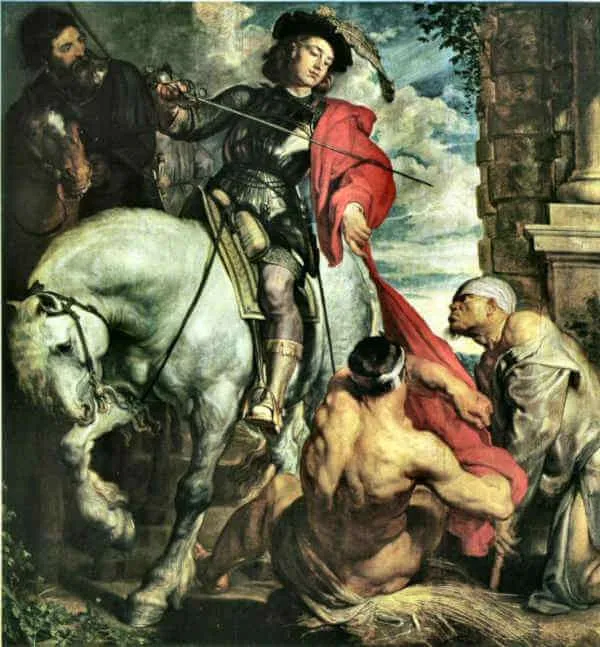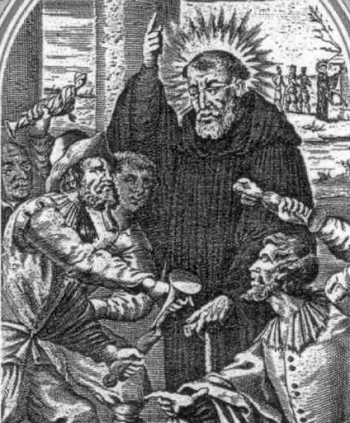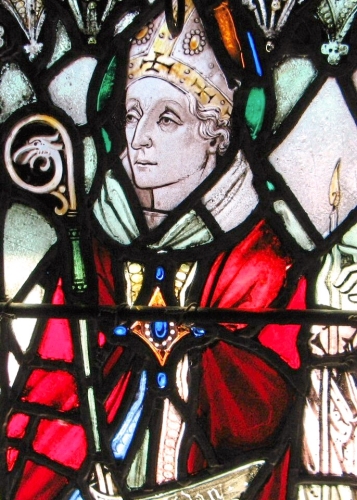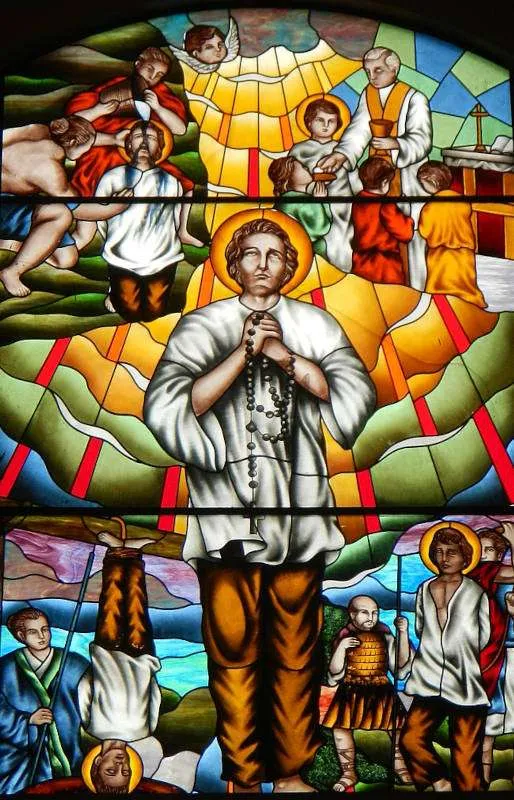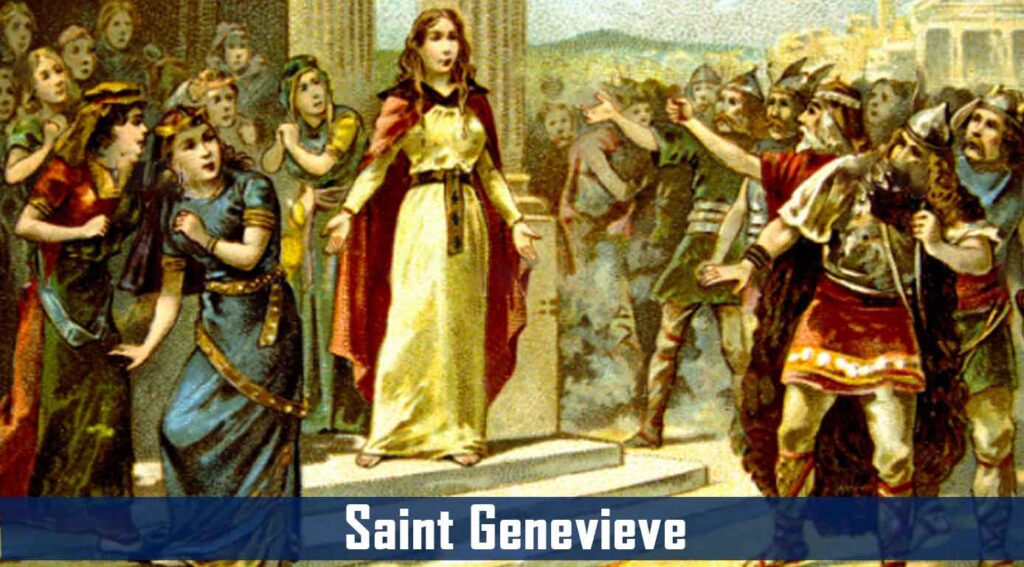316 or 336–397; Patron Saint of beggars, cavalry, equestrians, geese, horses, innkeepers, Pontifical Swiss Guards, quartermasters, reformed alcoholics, soldiers, tailors, and winemakers; Invoked against alcoholism and poverty; Pre-Congregation canonization
Saint Martin of Tours has been one of the most revered and loved saints in European history for two primary reasons: he lived a life of heroic sanctity, and someone wrote it all down. Sulpicius Severus is believed to have been a wealthy man who converted to Christianity through the ministry of Bishop Martin. He then became a priest, interviewed Bishop Martin before he died, and wrote a book about Martin’s incredible life. The book was copied over and over again and became one of the standard texts for religious and laity alike for many centuries. Numerous churches and monasteries bear Martin’s name as a result of his popularity.
Martin was born in Sabaria in Pannonia, within the Roman Empire, modern-day Szombathely, Hungary. Some early records state he was born in 316, others in 336. When Martin was young, his family moved to Ticinum, modern-day Pavia, northern Italy. He was born in the Roman Empire during an important period of change. In 313, Emperor Constantine issued the Edict of Milan, legalizing Christianity. Constantine then became a Christian himself, and it became known that he favored Christians over those who remained pagans. As a result, many people began converting, some for political and economic reasons.
Martin’s father was a soldier who advanced to the rank of military tribune. As a child, Martin became interested in Christianity, but his parents clung to Roman paganism, dismissing the newly legalized Christianity. Martin, however, was not satisfied with his parents’ choice. So, at the age of ten, he went to the local Catholic Church and asked to become a Christian. He was enrolled as a catechumen and began the lengthy process of preparing for Baptism, which would not take place until ten years later. When he was twelve years old, he asked his parents to permit him to become a hermit, but they refused. At the age of fifteen, in compliance with a state law requiring sons of military officers to enlist in the Roman military, Martin became a soldier. Despite being surrounded by many who lived immoral lives, Martin remained true to his faith and lived quite virtuously. His language was always respectful, he treated others with exceptional kindness, he often gave most of his money and belongings to the poor, he humbled himself by serving those who were supposed to serve him, and he continued his preparation for Baptism.
One day, while riding his horse through a town in the middle of winter, Martin came upon a poor man who was poorly dressed and shivering. The man begged people for help, but they ignored him. Martin knew he had to assist, but he had already given his money and other clothing away to the needy. All he had left was the military cloak he wore on his own back, so he dismounted his horse, took out his sword, cut the cloak in two, and gave half to the poor man. His fellow soldiers later laughed at his small funny-looking cloak. That night, Martin had a dream in which Jesus appeared to him wearing the half-cloak and said to a multitude of angels who surrounded them, “Martin, still only a catechumen, has clothed me.” When he awoke, he knew what he needed to do. He sought baptism, which he received at the age of twenty.
Martin remained in the military for two more years at the request of a friend. One day, the commanding officer was passing out bonuses to the soldiers as they prepared for battle the next day. When Martin was called forward, he stated, “I have been your soldier until now. Let me serve God henceforth. Give your bonus to someone who’ll fight for you. I am Christ’s soldier, and it’s not right for me to engage in battle.” Martin was accused of being a coward because they were going into battle the following day. To that accusation he replied, “If you believe I’m acting out of fear, I’ll stand unarmed in front of the enemy lines tomorrow. Shielded only by my faith in Jesus and the sign of the cross, I’ll face them without armor.” Martin was then thrown into prison to wait for the battle, which never happened because the opposing side sought peace. Martin was soon after released from the military.
Having heard of the renowned bishop and future Saint Hilary of Poitiers, Martin traveled to Poitiers in present-day France and stayed with the bishop for some time, learning from him the orthodox faith. He was also ordained a deacon and made an exorcist by Bishop Hilary. After Bishop Hilary was forced into exile for combating Arianism in the imperial court, and after Deacon Martin had a dream about converting his pagan parents, he decided to return to his hometown. On the way, he was attacked by robbers, but upon being asked who he was, he told one of the robbers that he was a Christian. Deacon Martin then shared the Gospel with the man, who repented, let Martin go, and later converted. When Deacon Martin arrived home, he converted his mother to the Christian faith but could not move his father. Others in his hometown also converted.
After encountering the wrath of some Arian priests whom he opposed, and even the Arian Archbishop of Milan, Deacon Martin and a priest spent time living as hermits on the Island of Gallinara. There they lived on herbs and wild roots. One day Martin ate a poisonous root by mistake, but through fervent prayer, God healed him.
Upon hearing that Bishop Hilary’s exile from Poitiers had ended, Deacon Martin moved to a town near the holy bishop and established a monastery. From there, he began preaching throughout the region and performing many miracles. He restored an unbaptized catechumen to life. When the catechumen returned to life, he stated that it was due to Martin’s prayers. On another occasion, Martin brought a slave back to life who had hung himself.
In 371, Martin was chosen by the consent of the people as the Bishop of Tours. Though he initially opposed it and tried to hide, he was tricked and led to the cathedral where his ordination awaited. Once ordained the Bishop of Tours, Bishop Martin moved outside the city and established hermitages with other clerics where he led a life of prayer. For the next twenty-six years, he lived both an eremitical life and also engaged in an active ministry. He traveled throughout Gaul (France), preaching, converting many, performing miracles, and casting out demons. He opposed heresies, worked with other orthodox bishops—such as the future Saint Ambrose of Milan—destroyed pagan temples, and gained the respect of all. His opponents feared him, and his supporters praised God every time they witnessed his ministry in action.
Though Saint Martin of Tours lived a life of heroic virtue and deep prayer, his life and veneration reveal the importance of sharing the stories of the saints with others. After his death, his life has continued to inspire many. As we honor Saint Martin, ponder any ways that God might want to use you as He used Sulpicius Severus, Saint Martin’s biographer. Though you might not be called to write a book about a saint you know, consider ways in which you can share the Gospel by learning more about the saints and sharing their stories with others.
Source: https://mycatholic.life/saints/saints-of-the-liturgical-year/saint-martin-tours/


